A great cup of coffee starts with using the best beans. You may think that only professional baristas can make a really good brew with all their fancy equipment, but the essence of a great cup of coffee is found in the beans themselves – are they richly flavored, roasted for peak flavor, and freshly ground?
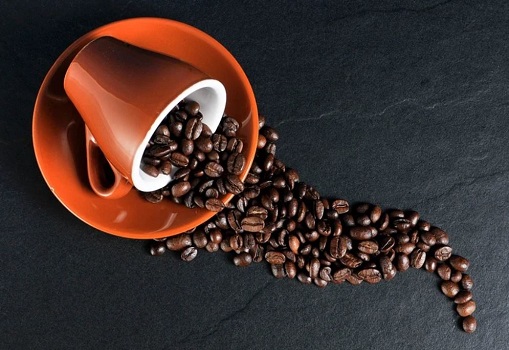
The fresher the grind, the more flavorful the cup of coffee. Some baristas use the rule of thumb that coffee should be used within 3 minutes of grinding to maximize taste and subtle flavors. So, if you can get your hands on a good coffee grinder (or your super automatic espresso machine has a a grinder built in), recreating your favorite coffee beverage without having to leave home is only a few grinds away. For the best-tasting drink, you should buy your beans whole and grind them yourself right before brewing.
You might also like to read: Composting coffee grounds to turn them into nutrient-rich compost for your plants.
Choosing the best coffee beans for you
Baristas and most espresso drinkers are familiar with the more common Arabica and Robusta coffee beans, but there are actually are four different types of coffee beans: Arabica, Robusta, Liberica, and Excelsa. The most popular and common coffee beans are Arabica and Robusta; you should try the other two if you find them. It is likely that you will encounter specialty or single-origin beans by geographic region — such as Kona Coffee or grown organically or following free-trade guidelines. Learn about all these bean varieties and and tips to choose the best coffee beans in this article.
Arabica vs. Robusta coffee beans
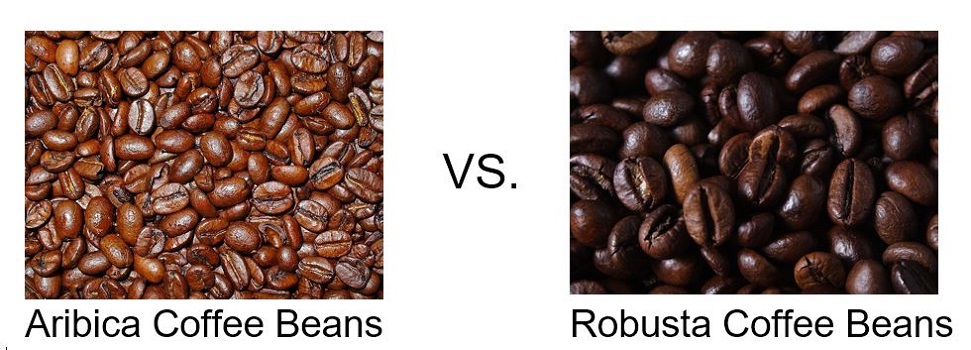
Most coffee drinkers prefer Arabica to Robusta. Although Arabica coffees can have a wide range of taste profiles depending on exactly how and where the beans were grown, Arabica coffees tend to be less bitter than Robusta coffees and to have subtler flavors with hints of fruit or chocolate.
You might also like to read: Ethiopian coffee regions which include Arabica coffee beans grown in the Sidamo region.
That being said, the more bitter taste of Robusta beans often has a place when brewing espresso. Often a blend of Arabica and Robusta beans are used for the best flavor in espresso.
Because of its more subtle and nuanced flavor, most coffee drinkers prefer Arabica. So, Arabica is the most produced and exported coffee worldwide (estimated to be about 60% of coffee traded), but Robusta coffee trees are easier to grow and are less subject to disease for the grower. You will find both beans at your favorite roaster (or for roasting).
If you would like to try coffee made from pure Arabica beans, we would suggest Kauai Whole Bean Coffee, Koloa Estate Medium Roast (view on Amazon) – 100% Arabica Whole Bean Coffee as a wonderful starting point.
Does Robusta produce better Crema?
Many espresso drinkers prefer the smooth, creamy texture from their crema. Using at least some Robusta when making espresso makes it easier to achieve that smooth, creamy texture that many espresso drinkers desire.
Robusta tends to have more caffeine
In fact, it appears to be the higher caffeine that makes the Robusta plant more disease resistant.
If you would like to try the unadulterated flavor of Robusta coffee beans, we suggest that you purchase the following Robusta Whole Bean Coffee from Vietnam (view on Amazon).
Also, make sure you try Liberica and Excelsa Coffee Beans to broaden your coffee experience.
Liberica Coffee Beans
It would be difficult to guess now that more than 100 years ago, Liberica coffee used to be a very popular coffee bean. Now they are considered an unusual treat.
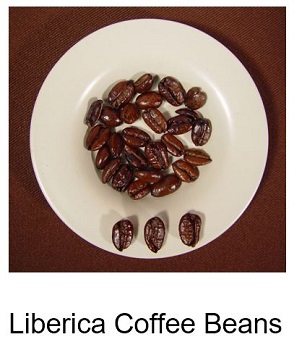
Liberica coffee grows on “trees” 20-30 feet tall and typically in jungle environment. The height of those trees and the typical jungle environment in which they grow make the harvest more difficult than other coffee varieties.
The climates in which they are grown are not conducive to very large-scale production. But at the height of Liberica’s popularity a plant disease called “coffee rust” had wiped out much of the Arabica coffee production worldwide.
The Philippines were first to really commercialize the growth of Liberica coffee, having a climate and geography well suited to the plant.
Liberica Coffee is known for its fruity, floral, and slightly wood flavor, and it was well received in the marketplace. Unfortunately (for the Liberica coffee market), the Philippines which, at that time, belonged to the United States, declared its independence.
In retaliation, the U.S. imposed trade sanctions on the Philippines which dealt a fatal blow to the new coffee industry and to the Liberica coffee bean industry. Now Liberica beans are grown in other, similar tropical locations such as Malaysia.
To try the pure flavor of coffee brewed from library Beans, you might try Aik Cheong Kopi-O Liberica Beans (view on Amazon).
Excelsa Coffee Beans
Excelsa coffee beans are typically from Vietnam where it is often used as a blending coffee that can add complexity to other coffees. Excelsa beans are typically processed using traditional methods including sun-drying.
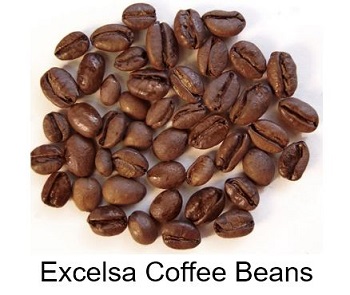
If you’d like to try the taste of pure Excelsa beans, we suggest ordering this Vietnamese Excelsa Whole Bean Coffee (view on Amazon)
Which Beans Are Best?
All of the coffee bean varieties are “best” for some specific purposes. Why don’t you try a virtual coffee tour and try all four major varieties of coffee beans so you can learn what each brings to the table.
Often coffee aficionados who prefer their coffee “straight up”, unadulterated with creamers, sweeteners, and other flavors, will prefer a light or medium roast Arabica coffee. Those who appreciate a good crema and more caffeine may well chose a hearty Robusta.
Make yourself more knowledgeable and appreciative of coffee varieties!
Check out our suggested choices for coffee beans.
Which coffee beans should I buy?
The best coffee is a very personal decision. Do you value crema? Do you want a mild coffee with floral bouquet? Do you want enough caffeine to knock your socks off?
We’ve tried a wide variety of beans, and we find that many combinations of bean types and roasts are “just right” for particular situations. We suggest that you sample a variety of coffees made the ways you prefer (espresso, pour-over, etc.) and form your own opinion through that experience.
FAQ’s
What are the best beans for espresso brewing?
As always, the ultimate judge of which are the best beans for brewing espresso is you. You should always prefer to use the freshest beans you can find. Especially check out the roast date. Many people find a blend of Arabica beans beans for smooth taste and subtle flavors and Robusta beans to add bold flavor and excellent Crema. You might find it beneficial to start with beings from a big roaster (like Peet’s), and then you can try other beans and have a baseline for comparison.
What are the best coffee beans to use in a French Press?
A French Press can be used to brew great coffee from almost any good beans. With a French press you can brew great coffee from dark roasts, blends, or single origin, either caffeinated or decaffeinated coffee. So pick your preferred coffee style, put it in your French press, and go for it!
What are the best coffee beans cold brew coffee?
Cold brewing tends to bring out the subtle flavors in coffee beans. You should start your search with beans that emphasize these subtle flavors. For example, you might start with Stonestreet cold brew coffee (view on Amazon) which is both smooth (low acid) and strong. It’s a Colombian single origin Arabica coffee. Use that coffee as your baseline, and feel free to explore from there.
How does Starbucks make cold brew coffee?
Don’t confuse cold brew coffee with iced coffee. Iced coffee is conventional hot coffee poured over ice, whereas cold brew coffee is ground coffee added to cold filtered water and allowed to steep for about 20 hours. If you want to make it easy on yourself, you can buy pouches at Starbucks of cold brew coffee concentrate that you can mix up at home. Otherwise, take your favorite coffee beans, grind them, put them in a picture of cold water and let steep for 20 hours…
Is there such a thing as GOOD decaffeinated coffee?
While the very terms good and decaffeinated coffee seem to be an oxymoron and sacrilegious to some of us, decaffeinated coffees have made huge improvements over earlier chemical tasting decaffeinated coffee. You might start by trying Decaf Dark Roast by Black Ink Coffee (view on Amazon) which is a medium roast decaffeinated by the Swiss water process.
You might also like to read: What is decaf espresso?
What are the best coffee beans in the world?
Some might argue (especially based on price) that kopi luwak, made from coffee beans plucked from the feces of civets, are the best to beans in the world.
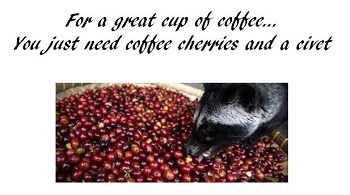
Assuming we don’t have any civets handy, many would suggest that Hawaiian coffee from Kona or Kauai beans are among the best in the world.
What is the best whole bean coffee?
While you should always start with whole bean coffee, there is no single best whole bean coffee. The answer, of course, is it depends on your personal tastes and mood. A good start would be to ask your local roaster to give you a quick tour of the coffees they have available–then you can branch out from there.
Is it cheaper to buy green coffee beans?
While it is cheaper to buy green coffee beans, the cost difference is a lot less than you might expect. Green coffee beans contain excess water and oil which is partially lost during the roasting process. Thus, by weight, you will end up with a smaller amount (by weight) of beans than you started with. Additionally, the roasting process itself is energy intensive and certainly will cost you something. The final risk to consider is that you need to buy significant quantities of green beans to save much money, and you may not want to do that because of the beans aging out before you use them. However, there would be a real benefit to buying green beans and roasting them yourself if you have some secret roasting process that produces just the taste you want.